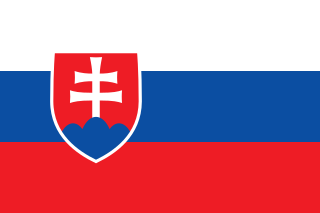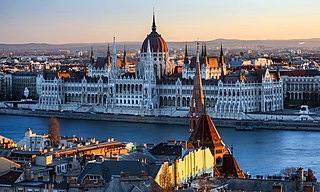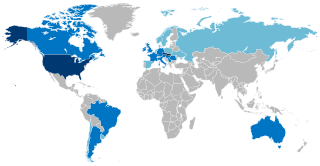See also
| Sovereign states |
|
|---|---|
| States with limited recognition | |
| Dependencies and other entities | |
Fauna of Hungary may refer to:

Austria-Hungary, often referred to as the Austro-Hungarian Empire or the Dual Monarchy, was a multi-national constitutional monarchy in Central Europe between 1867 and 1918. Austria-Hungary was a military and diplomatic alliance of two sovereign states with a single monarch who was titled both emperor of Austria and King of Hungary. Austria-Hungary constituted the last phase in the constitutional evolution of the Habsburg monarchy: it was formed with the Austro-Hungarian Compromise of 1867 in the aftermath of the Austro-Prussian War and was dissolved shortly after Hungary terminated the union with Austria on 31 October 1918.

Czechoslovakia was a landlocked state in Central Europe, created in 1918, when it declared its independence from Austria-Hungary. In 1938, after the Munich Agreement, the Sudetenland became part of Nazi Germany, while the country lost further territories to Hungary and Poland. Between 1939 and 1945, the state ceased to exist, as Slovakia proclaimed its independence and Carpathian Ruthenia became part of Hungary, while the German Protectorate of Bohemia and Moravia was proclaimed in the remainder of the Czech Lands. In 1939, after the outbreak of World War II, former Czechoslovak President Edvard Beneš formed a government-in-exile and sought recognition from the Allies.

Hungary is a landlocked country in Central Europe. Spanning 93,030 square kilometres (35,920 sq mi) of the Carpathian Basin, it is bordered by Slovakia to the north, Ukraine to the northeast, Romania to the east and southeast, Serbia to the south, Croatia and Slovenia to the southwest, and Austria to the west. Hungary has a population of 9.6 million, mostly ethnic Hungarians and a significant Romani minority. Hungarian, a language belonging to the Ugric branch of the Uralic language family is the official language, and Budapest is the country's capital and largest city.

Hungarian is a Uralic language spoken in Hungary and parts of several neighbouring countries. It is the official language of Hungary and one of the 24 official languages of the European Union. Outside Hungary, it is also spoken by Hungarian communities in southern Slovakia, western Ukraine (Transcarpathia), central and western Romania (Transylvania), northern Serbia (Vojvodina), northern Croatia, northeastern Slovenia (Prekmurje), and eastern Austria (Burgenland).

Slovakia, officially the Slovak Republic, is a landlocked country in Central Europe. It is bordered by Poland to the north, Ukraine to the east, Hungary to the south, Austria to the west, and the Czech Republic to the northwest. Slovakia's mostly mountainous territory spans about 49,000 square kilometres (19,000 sq mi), hosting a population exceeding 5.4 million. The capital and largest city is Bratislava, while the second largest city is Košice.

Budapest is the capital and most populous city of Hungary. It is the ninth-largest city in the European Union by population within city limits and it was the largest city on the Danube river; today it is the second largest one. The city has an estimated population of 1,752,286 over a land area of about 525 square kilometres. Budapest, which is both a city and municipality, forms the centre of the Budapest metropolitan area, which has an area of 7,626 square kilometres and a population of 3,303,786. It is a primate city, constituting 33% of the population of Hungary.

Ferenc Puskás was a Hungarian footballer and manager, widely regarded as one of the greatest players of all time and the sport's first international superstar. A forward and an attacking midfielder, he scored 84 goals in 85 international matches for Hungary and later played four international matches for Spain as well. He became an Olympic champion in 1952 and led his nation to the final of the 1954 World Cup. He won three European Cups, ten national championships and eight top individual scoring honors. Known as the "Galloping Major", in 1995, he was recognized as the greatest top division scorer of the 20th century by the IFFHS. Scoring 806 goals in 793 official games during his career, he is the seventh top goal scorer of all time by the RSSSF.

The forint is the currency of Hungary. It was formerly divided into 100 fillér, but fillér coins are no longer in circulation. The introduction of the forint on 1 August 1946 was a crucial step in the post-World War II stabilisation of the Hungarian economy, and the currency remained relatively stable until the 1980s. Transition to a market economy in the early 1990s adversely affected the value of the forint; inflation peaked at 35% in 1991. Between 2001 and 2022, inflation was in single digits, and the forint has been declared fully convertible. In May 2022, inflation reached 10.7% amid the war in Ukraine and economic uncertainty. As a member of the European Union, the long-term aim of the Hungarian government may be to replace the forint with the euro, although under the current government there is no target date for adopting the euro.

The Slovaks are a West Slavic ethnic group and nation native to Slovakia who share a common ancestry, culture, history and speak the Slovak language.

The prime minister of Hungary is the head of government of Hungary. The prime minister and the Cabinet are collectively accountable for their policies and actions to the Parliament, to their political party and ultimately to the electorate. The current holder of the office is Viktor Orbán, leader of the Fidesz – Hungarian Civic Alliance, who has served since 29 May 2010.

The National Assembly is the parliament of Hungary. The unicameral body consists of 199 members elected to four-year terms. Election of members is done using a semi-proportional representation: a mixed-member majoritarian representation with partial compensation via transfer votes and mixed single vote; involving single-member districts and one list vote; parties must win at least 5% of the popular vote in order to gain list seats. The Assembly includes 25 standing committees to debate and report on introduced bills and to supervise the activities of the ministers. The Constitutional Court of Hungary has the right to challenge legislation on the grounds of constitutionality.

The Hungary national football team represents Hungary in men's international football, and is controlled by the Hungarian Football Federation. The team has made nine appearances in the FIFA World Cup, and five in the UEFA European Championship. Hungary plays their home matches at the Puskás Aréna, in Budapest, which opened in November 2019.

Hungary is subdivided administratively into 19 counties and the capital city (főváros) Budapest. The counties are further subdivided into 174 districts. The capital Budapest is subdivided into 23 districts.
Elections in Hungary are held at two levels: general elections to elect the members of the National Assembly and local elections to elect local authorities. European Parliament elections are also held every 5 years.

Hungary has participated in the Eurovision Song Contest 17 times since making its debut in 1994. Hungary attempted to participate in 1993 but failed to qualify from Kvalifikacija za Millstreet, a special qualifying competition set up for seven former Eastern Bloc countries.
Hungarian Recording Industry Association is the Hungarian music industry association, founded in 1992. MAHASZ issues the Hungarian Music Awards, awards music recording certification and maintains the music charts for Hungary.
The Nemzeti Bajnokság, also known as NB I, is the top flight of Hungarian football league system. The league is officially named OTP Bank Liga after its title sponsor, OTP Bank.
This is a list collecting the most notable films produced in Hungary and in the Hungarian language.